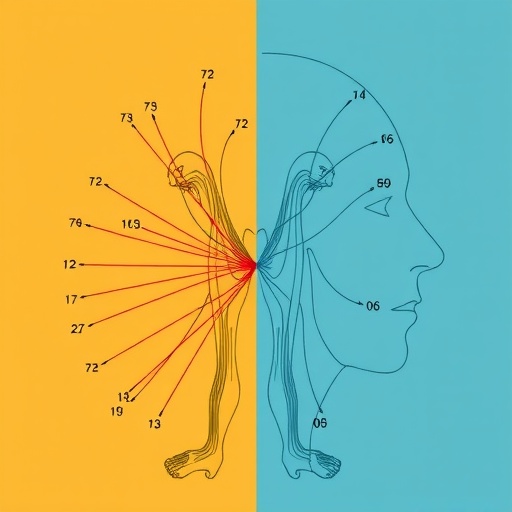PROTECT YOUR DNA WITH QUANTUM TECHNOLOGY
Orgo-Life the new way to the future Advertising by AdpathwayIn an era where medical science is forging new pathways in understanding diseases and treatment strategies, recent research has unveiled a groundbreaking approach in tackling one of the most challenging intersections of medical biology: the crosstalk between neural mechanisms and tumor proliferation. A collaborative effort led by Liu, Dong, and Wang has set the scientific community abuzz with their article, “Reprogramming neural-tumor crosstalk: emerging therapeutic dimensions and targeting strategies,” published in Military Medical Research. This innovative study meticulously examines the complex dialogue between neural cells and tumors, opening new avenues for therapeutic strategies and augmentative cancer treatments.
The researchers have deftly elucidated how tumors can exploit neural pathways for their own advantage, thus highlighting a multifaceted relationship that has long puzzled scientists. Tumors are not merely passive entities; they actively engage with the surrounding neural environment to promote their own growth and survival, employing a variety of neurogenic mechanisms. This transformative insight into tumor biology emphasizes that neural cells are not just bystanders but critical players in tumor development and progression. The implications of this finding are profound; they suggest that therapeutic interventions may need to target not just the tumor itself but also the accompanying neural architecture that supports and sustains tumor growth.
At the heart of this investigation is the phenomenon of neurogenesis, which refers to the growth of new neurons and connections in the nervous system. The team observed that certain tumors can stimulate the formation of new neural pathways, thereby enhancing their metabolic and energetic support systems. This adaptive strategy allows tumors to effectively manipulate their microenvironment, fostering an ecosystem that is conducive to their survival and proliferation. Such findings suggest that disrupting this neural-tumor nexus might represent a fruitful strategy for stymying tumor development.
Clinical observations have linked neurological disorders to altered tumor behaviors, particularly in aggressive cancer types. For instance, gliomas frequently exhibit profound interactions with the surrounding neural tissue, which facilitates their invasive capabilities and leads to poor prognostic outcomes. The research team posited that, by deciphering the molecular mechanisms underpinning these interactions, clinicians could devise therapies that disrupt these malignant communications. This could involve sifting through a plethora of neuropeptides and neurotransmitters, which signal localized effects that can have system-wide implications on tumor dynamics.
Moreover, the research provided a comprehensive overview of potential pharmacological avenues that could be employed to reprogram this detrimental dialogue. Modulating the activity of neurotransmitter receptors that mediate neuron-tumor communication could serve as a dual-targeting strategy—one that addresses both neural activity and tumorigenesis simultaneously. This multifaceted approach reflects a paradigm shift in oncology, where integrated therapies could significantly outperform traditional treatments that focus exclusively on the tumor itself.
Furthermore, the implications of this research extend beyond the immediate realm of cancer. The investigation of neural-tumor interactions could provide valuable insights into neurodegenerative diseases as well. A growing body of evidence suggests that the mechanisms governing neural plasticity are intricately involved in malignant transformation, hinting at a reciprocal relationship where neurodegeneration can, in some instances, predispose individuals to cancer. Such findings accentuate the need for a holistic view of disease processes that encompasses both neural and oncogenic parameters.
To further understand this enthralling phenomenon, the article delineates the importance of targeted delivery systems in potential therapeutic applications. The advancement of nanotechnology and precision medicine opens the door to strategies that can specifically target malignant cells while sparing healthy brain tissue. The researchers emphasize the significance of this targeting precision, arguing that it could minimize side effects and enhance therapeutic efficacy for patients suffering from both malignant and neurological conditions.
As we continue to unravel the intricacies of the neural-tumor interface, it is crucial to engage a multidisciplinary approach that spans neurology, oncology, and molecular biology. This research serves as a clarion call for collaboration among specialists from diverse fields, as harnessing collective expertise can facilitate a more nuanced understanding of the nuanced interactions at play. By fostering a culture of interdisciplinary research and dialogue, the scientific community can better equip itself to tackle the pressing challenges posed by tumors that intricately weave themselves into the neural landscape.
The findings presented by Liu and colleagues culminate in a robust model for future investigations, one that prioritizes the interactions between neurons and tumors. They propose a series of focused studies aimed at elucidating the precise biochemical pathways through which neural cells influence tumor progression. The elucidation of these pathways will undoubtedly pave the way for the development of next-generation therapeutics tailored to mitigate the beneficial influence neurons lend to malignant cells.
In addition, the article highlights the potential utility of existing drugs that target neurogenic pathways in improving cancer outcomes. The authors advocate for drug repurposing studies that could accelerate the translation of these findings into clinical practice, emphasizing a pragmatic approach to cancer therapy that could swiftly benefit patients without waiting for the immensity of new drug development processes.
Beyond the laboratory, the implications of this research reverberate in clinical practice. Physicians, informed by these new insights, may soon be empowered to incorporate neurological assessments into their diagnostic and treatment paradigms for cancer patients. The idea that managing a patient’s neurological health could influence their oncological outcomes signifies a novel approach to integrative medicine, emphasizing the importance of holistic patient care.
In conclusion, the exploration of neural-tumor crosstalk represents a frontier in cancer research with immense potential. The study by Liu et al. not only enriches our understanding of tumor biology but also lays the groundwork for innovative therapeutic strategies that harness the dynamic interplay between neural and malignant cells. As further research unravels the complexities of this relationship, the potential for developing effective interventions that alleviate the burden of cancer becomes increasingly tangible.
As we stand on the cusp of these scientific revelations, the collaboration across disciplines, a robust understanding of molecular interactions, and an unwavering commitment to patient-centric care will be crucial in steering the future of cancer treatment towards success. The intricate dialogue between neural pathways and tumors exemplifies the complexity inherent in human biology, challenging our perceptions and urging us to rethink conventional paradigms in medicine.
With ongoing studies and a promising outlook, the ability to reprogram neural-tumor interactions could lead us into a new era of cancer therapy, one that not only aims to eradicate tumors but also addresses the neural complexities of the disease, ultimately striving for a paradigm of healing that is as profound as the intricate relationships we are beginning to understand.
Subject of Research: Neural-tumor crosstalk mechanisms and therapeutic strategies.
Article Title: Reprogramming neural-tumor crosstalk: emerging therapeutic dimensions and targeting strategies.
Article References:
Liu, QQ., Dong, ZK., Wang, YF. et al. Reprogramming neural-tumor crosstalk: emerging therapeutic dimensions and targeting strategies.
Military Med Res 12, 73 (2025). https://doi.org/10.1186/s40779-025-00661-9
Image Credits: AI Generated
DOI:
Keywords: Neural crosstalk, tumor biology, cancer therapy, neurogenesis, multidisciplinary research, targeted therapies.
Tags: cancer treatment advancementscollaborative research in medical sciencecrosstalk between neural cells and tumorsimplications of neural support in cancerinnovative cancer therapiesMilitary Medical Research publicationneural mechanisms in tumor proliferationneural-tumor interactionsneurogenic mechanisms in cancerreprogramming tumor biologytargeting tumor microenvironmenttherapeutic strategies for tumors


 6 hours ago
7
6 hours ago
7





















 English (US) ·
English (US) ·  French (CA) ·
French (CA) ·